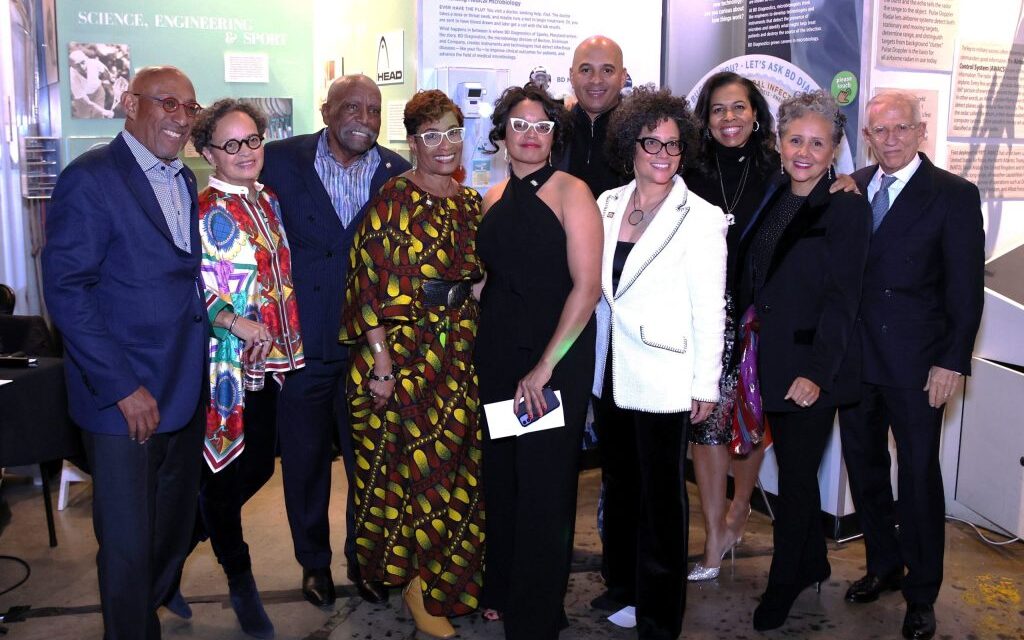By Megan Sayles
AFRO Staff Writer
msayles@afro.com
As the newspaper looks to its next chapter, the crucial succession question looms: Who can build on its powerful legacy?
It all started in 1892 when John H. Murphy Sr., a formerly enslaved man, borrowed $200 from his wife, Martha Elizabeth Howard Murphy to purchase a printing press for what would become the legendary AFRO-American Newspapers. What began as a church circular quickly became a vehicle for advancing Black rights and economic empowerment.

Shown here, from left to right: AFRO Board Member Dr. James Wood Jr., with Robin Wood, Esq, president Board of Directors for Afro Charities; AFRO Director of Operations Andre Draper; AFRO CEO and Publisher Frances “Toni” Draper; Afro Charities Executive Director Savannah Wood; AFRO Vice President of Marketing and Technology Kevin Peck (back); Angela
Wheeler; AFRO Director of Digital Solutions Dana Peck; AFRO Board member Laura Murphy and Bill Psillas. (AFRO Photo/ James Fields)
After Murphy’s death in 1922, his five sons took over, tasked with providing wages for their five sisters. Carl Murphy became editor and publisher. The family business has endured ever since and is set to celebrate its 132nd on Aug.13.
Today, the newspaper is a media company, also known as AFRO News, with offices in Baltimore and Washington, D.C. Dr. Frances “Toni” Draper, the great-granddaughter of Murphy Sr., sits at the helm as publisher and chairman of the board. Still, she said the crucial question of who will serve next is never too far in the distance.
“It’s an ongoing discussion,” Draper says. “There are a whole lot of people who have legal and stockholder interest in the company. But succession is always at the forefront, because we don’t want it to be left to happenstance or chance.”
Honoring the vision
One thing is clear to Draper: The next successor must uphold the newspaper’s original purpose, which John H. Murphy Sr. outlined in a letter to his five sons two years before his death.
He wrote: “A newspaper succeeds because its management believes in itself, in God, and in the present generation. It must always ask itself: whether it has kept faith with the common people, whether it has no other goal except to see that their liberties are preserved and their future assured; whether it is fighting to get rid of slums to provide jobs for everybody; and whether it stays out of politics except to expose corruption and condemn injustice, race prejudice and the cowardice of compromise.”

This charge has changed slightly over time, as readers have turned to the AFRO for endorsements of political candidates in addition to church and community happenings.
At present, the AFRO is a privately-traded C corporation. The vast majority of its nearly 100 shareholders and 17-member board are family members. Ownership has resided with the family since its inception in 1892.
Blending institutional knowledge with outside perspectives
Draper took over the AFRO in 2018 from John J. Oliver, who served as publisher and chairman of the board for 34 years. Oliver, great-grandson of John H. Murphy Sr., never intended to lead the AFRO, although he, like most family members, grew up working in the family business.
The emergence of the personal computer led him back to the company. Oliver recognized that the AFRO would need to embrace the digital revolution in order to compete. Gone were the days of linotype and teletype machines.
When it came time for Oliver to step down, he says there wasn’t a formal blueprint for Draper to take over.
“There wasn’t any real plan,” Oliver says.
Adding that “the younger generations caught on to the importance of taking advantage of digital opportunities quickly,” while also “exploring new ways in which they could radically change what we, historically, expected to be the way a newspaper is run.”
Kevin “MPECKABLE” Peck, vice president of marketing and technology for the AFRO, and Savannah Wood, executive director of the company’s philanthropic sister company, Afro Charities, are the great-great-grandchildren of John H. Murphy Sr. Several other fifth-generation members are involved via the AFRO board.
Both Peck and Wood oversee operational areas that will be key to the future of the media company, according to Draper.
Peck leads the company’s technology strategy, while Wood maintains the paper’s extensive archival collection, featuring nearly three million photographs, thousands of letters, rare audio recordings and other ephemera such as the program dispersed at the funeral of Shirley Parker, found dead in the fountain of the lake at Druid Hill Park Reservoir in 1968.
“A strength that Savannah and Kevin have is they didn’t do their entire careers at the paper,” Draper says. “They bring other experiences and they have ideas around what may appeal to their generation and the next.”
Draper, too, did not spend her entire career at the AFRO. She worked as an educator, stockbroker and preacher. She grew up working in the newspaper’s editorial department.
Peck has years of experience in the music business, serving as the long-time manager of notable acts like Dru Hill. Peck came to the AFRO to support his mother, Draper, as she took over as publisher. He continues to work with musical artists today, but much of his focus for the publication centers on leveraging emerging technologies to streamline the AFRO’s operations and content delivery.
Wood worked with various arts and humanities organizations in Chicago and Los Angeles before her arrival in 2019. She was initially the AFRO’s archives director. Shortly after becoming executive director of Afro Charities, management of the archives was transferred to the nonprofit partner.
Wood and Draper underscored the importance of the next successor being committed to supporting the preservation of the archives.
“The archives tell the story of the newspaper company, but also the broader story about world history through Black perspectives,” Wood says.
Peck said his mission at the AFRO has been taking it from the closet to the cloud, migrating elements of the company’s operations and data management to cloud-based platforms. He was instrumental in the company’s recent launch of the Digital Billboard Network (DBN). The AFRO’s DBN delivers original content to onsite screens at heavily trafficked community gathering spots like restaurants, barbershops, gyms and auto repair shops.
“The mission and the history and the shoulders that I stand on cannot be ignored. I have to impact the business in a way that’s never been done before,” said Peck. “I have to use all of my entertainment and marketing knowledge to make sure there’s not a Black person that doesn’t know the name of the AFRO.”
Peck acknowledged that he has considered how he would run the AFRO if he were chosen as the next successor. If he did get the call, he would take the position.
“I would have to. It would be destiny,” Peck says. “It would feel like everything up to that point prepared me for that next level.”
The ideal next leader
The successor needs to be able to sustain the newspaper’s historical identity and integrity while generating a roadmap for the company’s future, according to Max Hughes, senior manager, Deloitte Transactions and Business Analytics LLP, who specializes in privately-held and family-owned businesses. Picking the right person, he says, is important to keeping public trust and confidence in the legacy business.
“The right successor has to be a really special person, especially in a business like a newspaper where it’s a more public leadership role,” Hughes says. “You have this foundation and reputation and all of these things you’ve sustained on, and you have a great obligation to match that expectation.”
Micaela Saviano, a partner at Deloitte Tax LLP who specializes in succession planning, said though expectations within a family business can be high, a successor can draw in help from other sources.
“The next generation doesn’t need to fill the shoes of their predecessor fully. You can supplement with external advisors, other family members, non-family executives, and the board,” Saviano explains. “There are a lot of folks to rely on beyond that one individual.”
Draper said when it comes to her successor, she has several parameters in mind:
“They either need to have knowledge of trends in the industry or the ability to access that knowledge. They must be able to successfully navigate relationships with readers, policymakers, leaders, advertisers and employees,” she says. “You need someone who understands business, and it doesn’t hurt to have someone who is either technologically savvy or has an appreciation for changing technologies.”
This article was originally published by The Exchange.
The post Standing on 132 years of history: A look at the future of the AFRO appeared first on AFRO American Newspapers.











